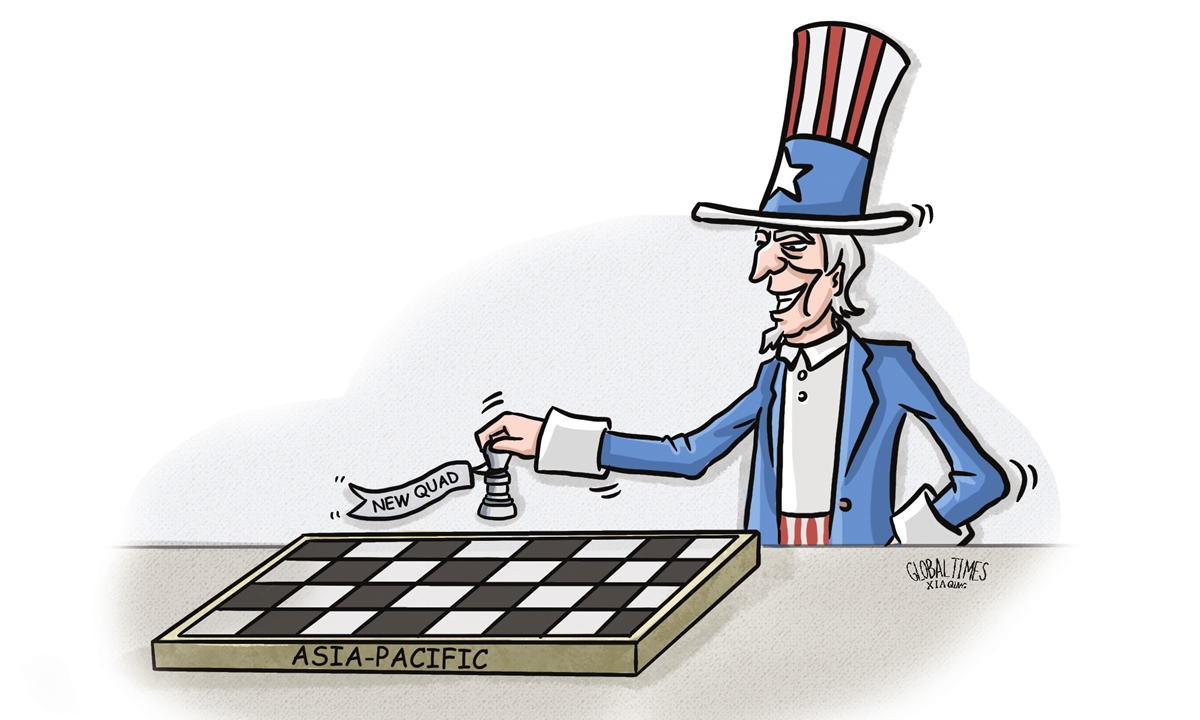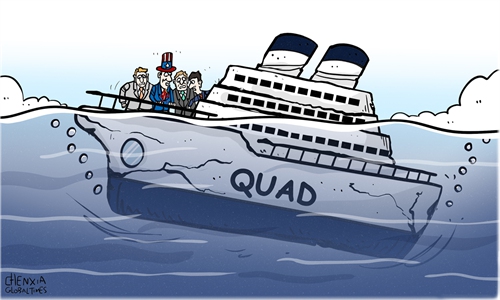
Illustration: Xia Qing/GT
Military cooperation between the Philippines and the US has been intensifying lately, and discussions are bubbling up about the possibility of the US-Japan-Australia-Philippines grouping becoming the new Quad. Will the US-Japan-Australia-Philippines grouping serve as a starting point for extending US military cooperation in the Asia-Pacific region? The answers to the question are intriguing.Looking back, the Philippines is facing two worrisome geopolitical conjectures. The first is the expanded EDCA (Enhanced Defense Cooperation Agreement) with the US, which includes the construction of four new EDCA sites (US military bases). Three of these sites are near and facing the Taiwan Straits, while the other one is near and facing the South China Sea. The second concern is the consequences of Philippine President Ferdinand Marcos Jr's visit to Japan from Feb 8 to 12 of this year. This visit led to the further strengthening of military, defense, and security ties and cooperation between the Philippines, Japan, and the US, as well as the holding of joint military exercises with the two countries.
To note, it has been reported that Tokyo and Manila are in the initial stages of discussions regarding a potential triad defense pact between the US, Japan, and the Philippines. This pact would allow for the deployment of troops on Philippine territory for training and other operations. Additionally, Tokyo and Manila are exploring the possibility of forging a Visiting Forces Agreement (VFA) under the pretext of maritime security.
In addition to the EDCA, the Philippines also has a VFA with the US, and the mother treaty, the Mutual Defense Treaty (MDT) between the Philippines and the US, is thriving under the presidency of Marcos Jr. Australia also has a Status of Visiting Forces Agreement (SOVFA) with the Philippines.
Given these geopolitical conjunctures, and the fact that Australia, Japan, and the Philippines are military and defense allies of the US, it is not far-fetched to envision that the US-Japan-Australia-Philippines grouping could become the "new Quad." The forging of the US-Japan-Australia-Philippines military alliance could serve as a starting point for US military cooperation to expand and be operationalized in the Asia-Pacific region. In fact, this is already happening and is well underway.
Nevertheless, the configuration of this so-called "new Quad," which is being shepherded by the US as it pushes and carries out its "pivot to Asia" foreign policy, is undoubtedly a manifestation of the US' propensity for stage-managing block confrontation as an extension of a Cold War mentality, directed against China.
Hence, this theoretical "new Quad" in which India is not included and is superseded by the Philippines, is not much different from the "old Quad." The primary objective remains the same, which is to contain China's peaceful rise. Just like the "old Quad," the "new Quad" is a military-defense alliance bloc orchestrated by the US as a countermeasure to China's growing political, economic, and militarily influence in the Asia-Pacific region.
This "new Quad," like the "old Quad" and AUKUS, is simply a narrower, security-focused initiative of the US, Japan, and Australia, with the Philippines as a co-opted member, aimed at isolating and containing China. As a result, this "new Quad" runs the risk of creating divisions and even confrontation among Asian countries. It could potentially trigger an arms race in the region, prompting China to enhance its military deterrence capabilities and other countries to follow suit. The formation of a "new Quad" also carries the risk of armed conflict in the Asia-Pacific region, endangering regional peace and stability.
Therefore, countries like the Philippines should be cautious about joining such a grouping or bloc, as it could further fuel the growing rivalry between China and the US in the region. Instead, Asia-Pacific countries like the Philippines should prioritize common interests, find a middle ground amid conflicting interests, and seek greater value in pragmatic win-win cooperation. Additionally, countries in Asia must strive to establish a stable balance of power through multilateralism and bilateralism, while avoiding unilateralism and the formation of "cliques," "blocs," or groupings that target a specific country. They should work toward promoting peace, stability, and prosperity in Asia and the world.
Likewise, the people of the Philippines should be vigilant and wary of the possibility of becoming part of a "new Quad" or quadrilateral defense and military pact between Japan, the US, and Australia to isolate and target China. This could lead to disaster and discord in the Asia-Pacific region. Furthermore, the "new Quad" could lead to further militarization of the Philippines, which is already underway due to the full implementation of the EDCA, enhanced joint patrols between the US and the Philippines, and the deployment of more US troops and military assets on Philippine soil. Therefore, the Philippine government must carefully study this matter and exercise prudence. The people of the Philippines must oppose this before it is too late.
In retrospect, if this bloc confrontation is left unchecked and unopposed, the world will fall into cliques pitted against each other, which may lead to a full-blown military conflict. Thus, Asians must fight back and resist the costly consequences of bloc politics, a Cold War mentality, and dangerous geopolitical games played by the superpower and its Asia-Pacific allies.
The author is a senior research fellow of Global Governance Institution, and vice president of External Affairs of the Asian Century Philippines Strategic Studies Institute. opinion@globaltimes.com.cn

